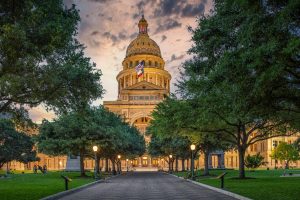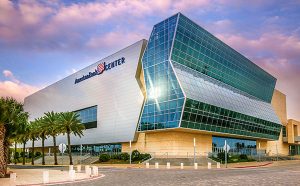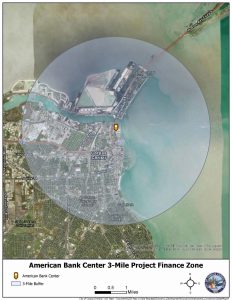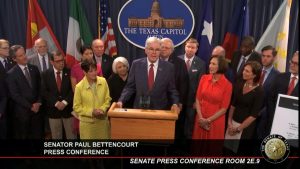On Saturday, May 31st, the Texas Senate approved the final version of Senate Bill (SB) 1, the General Appropriations Act (budget bill) for the 2026-27 biennium. This bill was authored by Senator Joan Huffman, Chair of the Senate Finance Committee. On May 27th, the Senate also approved House Bill 500, the Supplemental Appropriations Bill, also led by Senator Huffman. Both bills are now headed to Governor Greg Abbott for final approval. Senator Juan “Chuy” Hinojosa serves as the Vice Chair of the Senate Finance Committee.
Senator Hinojosa issued the following statement:
“I was proud to vote for Senate Bill 1, the state budget for the next two years. When we began the budget process earlier this year, the All Funds budget, including federal funds, was $332.9 billion. The budget we passed today has grown to $338 billion. This figure includes $149 billion in General Revenue Fund (state) dollars.
Our approved budget prioritizes public education, tax relief, public safety, infrastructure, and improved taxpayer services for both individuals and businesses while also making important investments to maintain Texas’ economic competitiveness.
Throughout the session, public education funding has been a top priority. This budget allocates an additional $8.5 billion to provide a much-needed permanent pay raise for teachers, librarians, janitors, food service staff, and other support personnel. SB 1 provides resources for school safety, makes significant investments in special education, and allows schools greater flexibility in utilizing increased funding from the basic allotment.
Property tax relief was another priority. This budget adds $10 billion from the introduced bill for property tax relief, bringing the total tax relief package to $51 billion for the upcoming biennium. These funds will allow for an increase in the homestead exemption from $100,000 to $140,000 for all homeowners, with an additional $60,000 exemption for homeowners over 65 and disabled homeowners, contingent upon voter approval of the constitutional amendments in November.
The budget also includes the following significant investments: $40 billion for the Texas Department of Transportation, $10.8 billion for higher education formula funding, $6.4 billion for the state contribution to the Teacher Retirement System, $5 billion for the Texas Energy Fund, $3 billion to establish the Dementia Prevention and Research Institute of Texas, $850 million for a Texas State Technical College endowment fund to support capital projects, $304 million for the Graduate Medical Education Expansion program, and $100 million for grants for farmers. These are just a few examples of the investments included in the budget.
In addition to SB 1, the Legislature recently finalized HB 500, the Supplemental Appropriations bill, which is also on its way to the Governor’s desk. Key highlights include: $2.5 billion for water infrastructure and related grants, $131.3 million to access matching federal funds, $1.3 billion for the Texas University Fund, $350 million for the Texas Advanced Nuclear Development Fund, $250 million for semiconductor initiatives, $257 million for the purchase and operation of aircraft for wildfire suppression, $192.3 million to address the backlog for Fire Department Assistance, $124.8 million to cover the use of firefighting aircraft, $135 million to the Texas Division of Emergency Management for regional operations facilities and emergency response support, $369.2 million to the Teacher Retirement System of Texas (TRS) for the benefit of TRS-ActiveCare, and more.
These balanced budgetary decisions reflect our commitment to investing in Texas’ future, ensuring the continued growth and prosperity of our communities.”
Both SB 1 and HB 500 include significant investments for projects in the Rio Grande Valley and the Coastal Bend including:
Public Safety/Emergency Response/Military Support
· $110.2 million for Grants for Local Border Security
· $34.5 million for Anti-Gang Programs
· $30 million for Defense Economic Adjustment Assistance Grants to military defense impacted communities.
· $3 million for Grants for Border Zone Fire Departments
Transportation
· $10 million for South Texas International Airport in Edinburg
· $18 million to Weslaco Airport for Hangar and Runway Expansion
· $40 million for Port Access Improvements grants.
Education
· $351 million for UTRGV General Academics
· $97 million for UTRGV School of Medicine
· $154 million for Texas A&M University – Corpus Christi
Water Infrastructure
· $15 million for Delta Region Water Management Project in Hidalgo County
· $30 million for Nueces River Ground Water Wells
· $16 million for Mary Rhodes Pipeline Upgrades
· $4 million for Nueces County Drainage District #2
· $5.3 million for City of Alamo Lift Station Upgrades
· $8 million for City of Weslaco Water and Drainage Improvements
· $750,000 City of Penitas Lift Station
Parks and Economic Development:
· $30 million for the Ritz Theater in Corpus Christi
· $5 million for Quinta Mazatlan in McAllen
· $2 million for Texas State Aquarium in Corpus Christi
· $1 million for the City of Pharr All-Abilities Park
· $1 million for Sullivan City Park Upgrades
· $1 million for City of Granjeno Park
· $1 million for City of Alton Park
· $1 million for City of La Joya Parks
Once approved by the Governor, items funded in SB 1 will take effect September 1, 2025. Items funded in HB 500 become effective as soon as the Governor signs the bill.






 City of Corpus Christi Entitlement Could Total $177 Million Over 30 Years
City of Corpus Christi Entitlement Could Total $177 Million Over 30 Years





